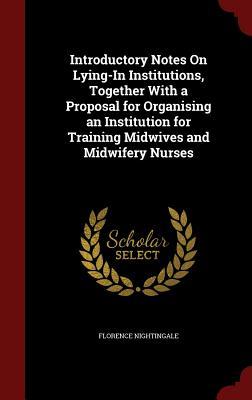- Biblia
- Leer la Biblia
- Versiones de la Biblia
- Verso del dia
- Planes de lectura
- Versos por tema
- Books of the Bible
- Imágenes De La Biblia
- Estudio
- Comentarios
- Concordancias
- Diccionarios bíblicos
- Enciclopedias bíblicas
- Sermones
- Bible Atlas & Maps
- BP Wiki
- Devocionales
- Devocionales de hoy
- Light of the World
- Todos los devocionales
- Inspirational Quotes
- Más
- Picture Quotes
- Videos
- Inspirador
- Estudio Bíblico
- Lo que dice la Biblia
- Bible Q&As
- Daily Bread
- Bible by Genre
- Bible Stories
- Random Bible Verse
- Comunidad
- Store
Introductory Notes on Lying-In Institutions, Together with a Proposal for Organising an Institution for Training Midwives and Midwifery Nurses
by Florence Nightingale
This work has been selected by scholars as being culturally important, and is part of the knowledge base of civilization as we know it. This work was reproduced from the original artifact, and remains as true to the original work as possible. Therefore, you will see the original copyright references, library stamps (as most of these works have been housed in our most important libraries around the world), and other notations in the work.
This work is in the public domain in the United States of America, and possibly other nations. Within the United States, you may freely copy and distribute this work, as no entity (individual or corporate) has a copyright on the body of the work.
As a reproduction of a historical artifact, this work may contain missing or blurred pages, poor pictures, errant marks, etc. Scholars believe, and we concur, that this work is important enough to be preserved, reproduced, and made generally available to the public. We appreciate your support of the preservation process, and thank you for being an important part of keeping this knowledge alive and relevant.
BUY NOW
Hardcover, 160 pages
Published August 11th 2015 by Andesite Press (first published June 28th 2012)
Suscribir
© 2025 Bibleportal.com Reservados todos los derechos.

1820-1910
Florence Nightingale who came to be known as "The Lady with the Lamp", was a pioneering English nurse, writer and noted statistician.
Inspired by what she took as a Christian divine calling, experienced first in 1837 at Embley Park and later throughout her life, Florence announced her decision to enter nursing in 1845. Nightingale worked hard to educate herself in the art and science of nursing, in spite of opposition from her family and the restrictive societal code for affluent young English women.
She cared for people in poverty. In December 1844, she became the leading advocate for improved medical care in the infirmarie. This led to her active role in the reform of the Poor Laws, extending far beyond the provision of medical care.
... Show more